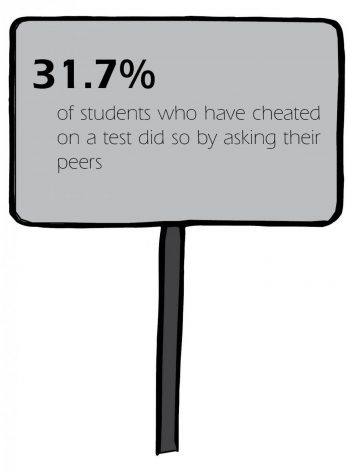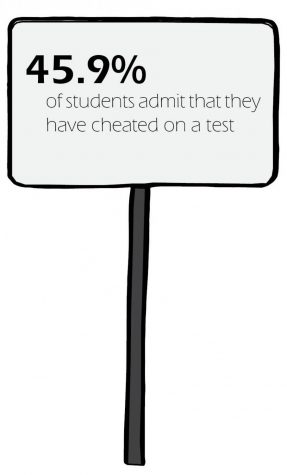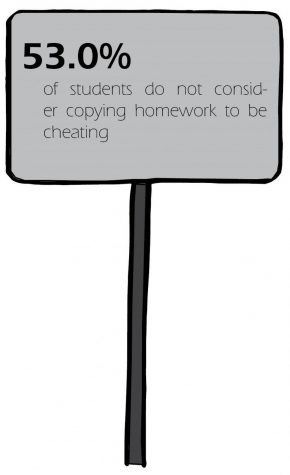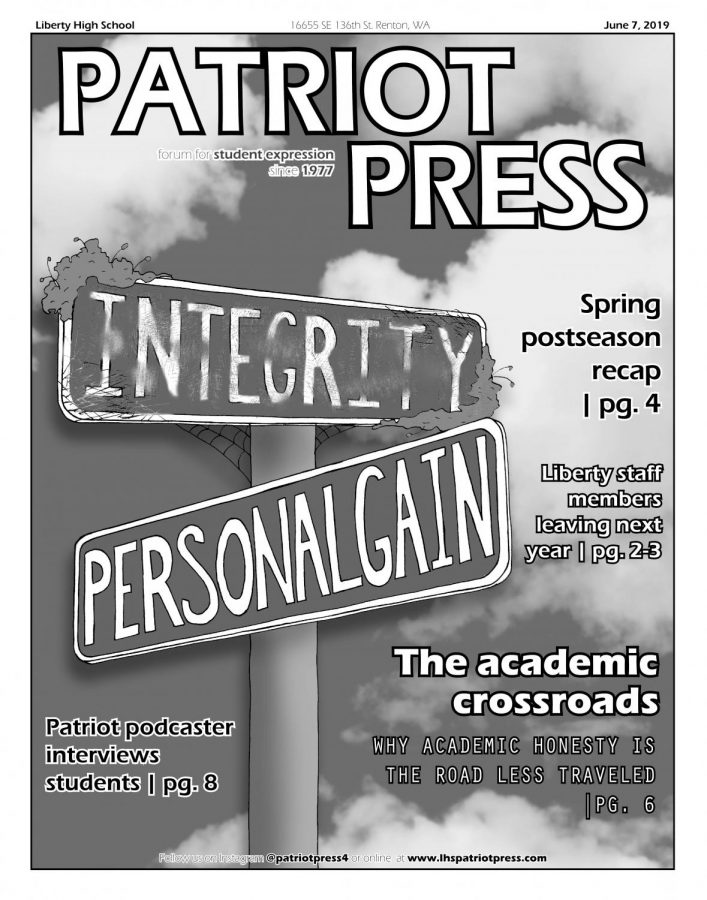Academic integrity: cheating isn’t always black and white
In the wake of college admission scandals, questions about academic integrity have come up over and over again: why do students cheat? What can they gain from such dishonest actions, and are there honest alternatives to cheating that help students get ahead? Because what may seem like a few little shortcuts can impact students for months to come.
If you’re sitting in the cafeteria or your second period class as you read this, take a look at the people to your left and to your right. Examine the students in front of and behind you. Here at Liberty, odds are, all four of your surrounding peers have violated academic integrity, and at least two of them have done so multiple times.But what exactly is academic integrity? In Liberty’s student handbook, this lofty idea “speaks to a student’s commitment and responsibility to pursue scholarship honestly. It respects the concept that learning is the primary purpose of education, secondary to grades and credits.”
For teachers, the most important part of this definition is learning versus grades. Many Liberty staff, including English teacher Henry Level, wholeheartedly agree that grades should not be the primary motivation for a full education.
“A grade is not that important,” Level said. “I just don’t understand why you would want a score that didn’t reflect what you could do. Why would you want a score higher than what you deserve?”
However, it’s not always easy to put education above grades. For many high school students, getting into a good college is important. Because colleges tend to look at numerical measurements like GPA, grades become standards for success that students strive to meet. Consequently, students have begun to cheat in order to maintain a high GPA.
“People cheat because we have so much pressure placed on us to achieve certain standards, and sometimes we’re not always able to meet those standards,” junior Alison Fullington said. “We feel that we won’t be good enough if we don’t, so we cheat to make it look like we’re good enough.”
But why would students cheat when there are other options? What prompts students to turn away from completing their own work, and instead move towards copying homework or cheating on tests?
“I’ve mostly heard that homework is too much effort, and people don’t have enough time to do it,” junior Chris Lew said. “There aren’t people that I know who just cheat for fun.”
Getting homework done for points may seem logical, but is it worth the price? Even if you don’t get caught, there are still significant repercussions. By copying homework or cheating on a test, students don’t actually learn the material and instead struggle to catch up with classwork in the future.
“Everything in education is built on scaffolds. If you take a shortcut, you’re dealing with a hole of knowledge that you really need,” Principal Sean Martin said. “By cheating, you’ve dealt with the short-term stress of needing a certain number of points, but if you haven’t built up those skills, it’s just going to come back to hurt you over time.”
This cheating phenomenon exists in the recent college admission scandals as well. Bribing your way into college, paying another student to take your SAT, or paying an adult to write your admissions essays all have negative repercussions beyond simply guilt or legal consequences.
“Cheating actually sets students up for failure,” Martin said. “If they’re showing that they have a level of understanding that they don’t actually have, professors are going to assume a level of knowledge and background and academia that the student doesn’t actually have.”
Cheating also harms more than just those students personally involved.
“It’s unfortunate for the university because they’re missing out on talent, it’s unfortunate for the student who was not able to get in, and it’s unfortunate for the student who got admitted because they’re likely in over their head,” Martin said.
“All that money… if you’re that wealthy, why can’t you invest in a tutor?” senior Anne Vincent* wondered. “Is there not any sense of guilt that you have, just buying your way into elite institutions that people really work hard for?”
Math teacher Thomas Kennedy has an answer.
“Parents want their kids to succeed, and part of succeeding is going to a good college, so they can fix it,” he said. “Yes, money buys everything, so yes, it makes sense. When people are outraged and offended and surprised by that stuff, it just blows my mind. I don’t understand it at all.”
Locally, teachers and students alike have noticed an upswing in the amount of cheating. But what is to blame?
“Liberty’s evolution over the past twenty-five years from a rural school that doesn’t really care about education on average to a suburban school with high incomes that cares about education increases the amount of cheating,” Kennedy said.
Another cause seems to be its cultural acceptance in school to achieve higher grades.
“Students have been together since elementary school, so it seems like it can be part of the culture,” biology teacher Erin Stephens said. “People don’t understand that cheating is not okay.”
Because cheating is a high school problem that stays with students as they age, the ramifications of continuous dishonesty in college in particular are enormous.
“Academic integrity is a really serious issue. I always hear from students that I’m harsh for giving them a zero on an assignment that they plagiarized, but I hope that students recognize that in comparison to college, I’m not harsh,” Level said. “You’re going to lose credit in the course, and you could lose scholarships or get kicked out of the school.”
And continuous violations don’t just happen to lazy or dishonest students.
“People should stop thinking of cheating as something that only bad people do, because I think that almost everybody cheats when they can. It’s human nature to take the short route,” Kennedy said. “Cheating is a really natural thing, and if you provide incentive for cheating—like better SAT scores and admission into top colleges—then of course people are going to cheat. You want to provide incentive structures that don’t encourage people to cheat, but that’s harder.”
Academic dishonesty now seems to be an impossible problem to solve, as it is part of Liberty’s culture and, apparently, ‘human nature.’ However, there are easy solutions available for every student.
 “I want to encourage students to work together. I always want my students collaborating, but you should never have two papers side by side, transferring words over. Learning to have conversations with your peers is really important,” Stephens said.
“I want to encourage students to work together. I always want my students collaborating, but you should never have two papers side by side, transferring words over. Learning to have conversations with your peers is really important,” Stephens said.
Even good students can benefit from using resources available.
“Come get help,” Stephens said. “Teachers want to help you, and some of my best students have come in early and often, and it’s just the best thing to do.”
Ten to fifteen minutes after class can make all the difference, too; understanding one concept or equation can raise your test grade significantly. Hard work benefits students more in the long term, both academically and mentally, than the accumulation of points from copying homework assignments.
“I think you get out what you put in, and you shouldn’t expect money or someone else’s work to make you any better,” Vincent* said. “You have to grind it out and be proud of what you put in.”



